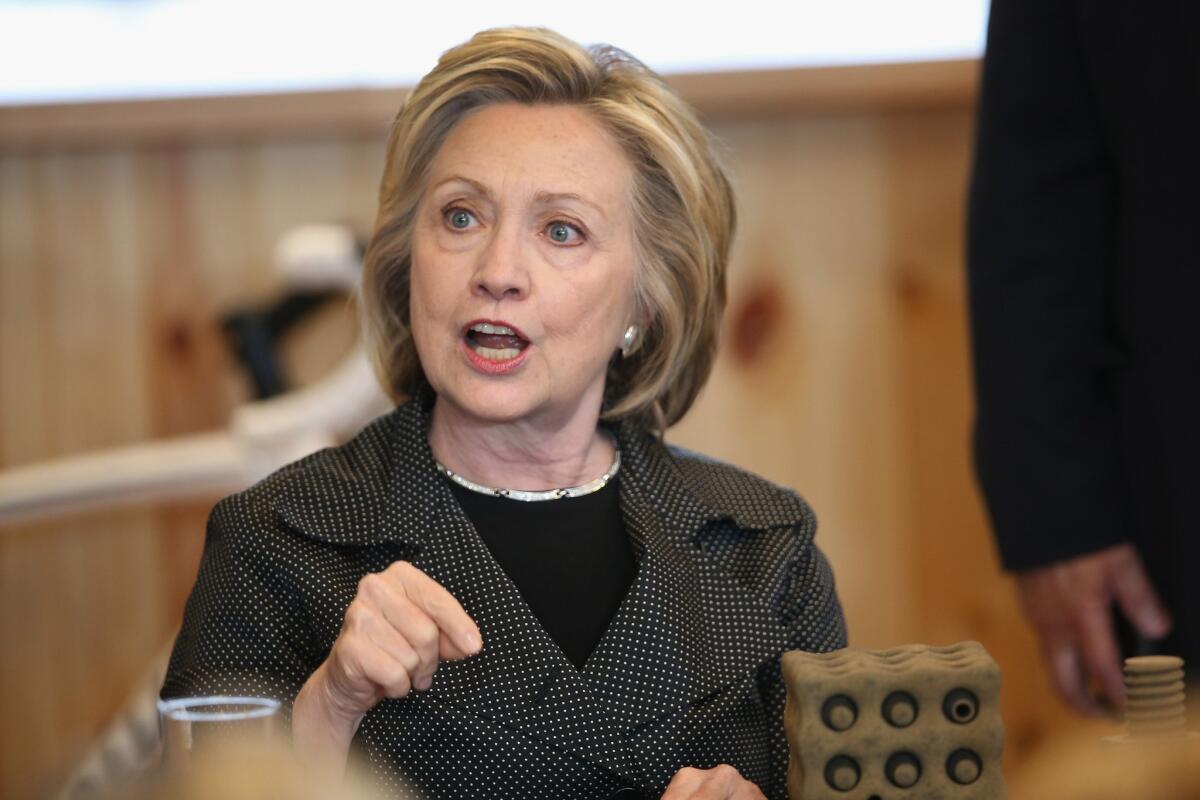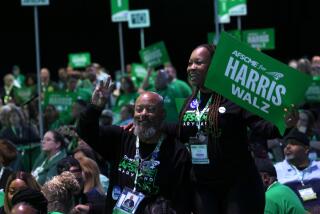Democrats still like Clinton, Republicans satisfied with their field, poll finds

Former Secretary of State Hillary Rodham Clinton hosts a small-business forum Tuesday in Cedar Falls, Iowa. A new poll shows that about three-quarters of Democrats view her favorably.
- Share via
Reporting from Washington — Republicans have a boatload of presidential candidates, and Democrats have one clear front-runner, but in both parties most voters seem satisfied with their choices so far, a new poll indicates.
The latest survey by the nonpartisan Pew Research Center also finds that interest in the presidential campaign has risen notably as candidates have begun to enter the field. Two-thirds of voters said they were thinking about the campaign, up 8 points in two months. But fewer than 1 in 3 say they are thinking “a lot” about presidential politics this far ahead of the November 2016 election.
Among Republicans and Republican-leaning independents, 57% say they have an excellent or good impression of their party’s candidates, while among Democrats and Democratic-leaning independents, 54% do, the poll found.
For the GOP, that’s a notable switch from this point four years ago, when only 44% said they had such a positive view. The field at that time had only a couple of well-established political figures in it. Partisans on both sides have a more positive view of the choices than they did in the run-up to the 2004 election, when about 4 in 10 rated their parties’ candidates as excellent or good.
The survey asked for specific impressions of Hillary Rodham Clinton and six GOP presidential hopefuls -- Jeb Bush, Marco Rubio, Scott Walker, Rand Paul, Ted Cruz and Mike Huckabee.
Bush, the former governor of Florida and brother and son of former presidents, was the best-known on the GOP side, with only 12% of Republicans and Republican leaners saying they could not rate him. He also had the largest share with a negative impression, 35%, compared with 52% positive.
Walker, the Wisconsin governor, was the least known, with 36% not able to rate him. He also had the best ratio of positive to negative opinions, with only 17% unfavorable compared with 46% favorable. The numbers reflect the good start Walker has had in his as-yet-unofficial campaign, but also the fact that he has yet to establish a clear image for many.
Conservative Republicans are more likely than moderates or liberals to have opinions about the GOP field. They are a bit less positive about Bush than are moderates and liberals, but not dramatically so, with 37% of conservative Republicans and 34% of the party’s moderates and liberals having an unfavorable view of him.
Both Walker and Rubio, the Florida senator, get significantly more favorable opinions from conservatives than nonconservatives in the party -- a potentially important factor in a party where conservatives dominate the primary voting.
Clinton’s ratings have declined, but she remains extremely popular among Democrats or Democratic leaners, with 77% having a favorable opinion of her. That’s down from 86% last summer, but still a much higher number than any of the Republicans garner among their partisans.
Among the public at large, opinion is closely divided on Clinton, with 49% viewing her favorably and 47% negatively. Her ratings are down most sharply among Republicans, 17% of whom now say they view her favorably.
The youngest Democrats, those aged 18 to 26, were least likely to have a positive view of Clinton, with 65% viewing her favorably. Among other age groups of Democrats, about 8 in 10 had a favorable view.
Although some liberal activists have pined for alternative candidates, 81% of liberal Democrats viewed Clinton positively, compared with 74% of conservatives and moderates. And despite her potential appeal as the first female elected president, male Democrats were about as likely to have a positive view of Clinton as females.
By contrast with Clinton’s generally positive ratings among Democrats, Vice President Joe Biden’s star has faded. Only 58% of Democrats and Democratic-leaning independents viewed him favorably, and among voters overall, 39% have a favorable view compared with 48% who view him unfavorably.
The Pew survey, conducted May 12-18, polled 2,002 adults, including 1,497 registered voters. The margin of error for the registered voter sample was +/- 2.9 percentage points.
For more on politics and policy, follow @DavidLauter on Twitter.
More to Read
Get the L.A. Times Politics newsletter
Deeply reported insights into legislation, politics and policy from Sacramento, Washington and beyond. In your inbox twice per week.
You may occasionally receive promotional content from the Los Angeles Times.











